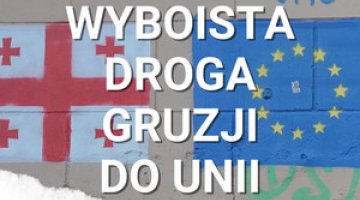Georgia: the opposition is holding its first rally
On 19 April, the United National Movement (UNM) led by President Mikheil Saakashvili held its first rally in the centre of Tbilisi since the parliamentary election last October. The overriding theme was the protection of Georgia’s pro-Western line in foreign politics. The rally was peaceful and the number of participants may have exceeded ten thousand. Results of opinion polls commissioned by the US National Democratic Institute (NDI) were published on 22 April: the support level for the government coalition Georgian Dream (GD) is 60% while the figure for UNM is 10%. The most popular politician is Prime Minister Bidzina Ivanishvili, who has an approval rating of 75%. President Saakashvili and the other UNM leaders are backed by approximately 25% of respondents, but they have a strong negative electorate (over 50%). The results of this poll are similar to those of the survey ordered by the NDI last November.
Commentary
- The United National Movement has become mired in crisis following its electoral defeat bringing to an end almost a decade in power. Twelve deputies in parliament and many local officials and politicians have left the party (according to claims made by the UNM, some of have done this under pressure from the new government). There has also been broad speculation that conflicts and divides are present inside the party. The rally in Tbilisi was intended to demonstrate the unity and vitality of UNM and to prove that – as the former parliamentary speaker, Davit Bakradze, put it – that this is now “a different party, with new energy, new blood and a new vision, a party which has learnt a lesson from its mistakes.”
- The fact that UNM has survived the loss of power and – contrary to expectations – avoided meltdown, is a success and novelty in Georgia’s modern history. However, declarations made by the party’s representatives that the crisis has been overcome seem to be something of an overstatement. The presidential election scheduled for October this year will put an end to the cohabitation of the new government and Saakashvili (who ensures to safe anchorage to UNM in the still influential if significantly weakened presidential administration), which has existed in Georgia since the parliamentary elections. Although the new president’s prerogatives will be restricted in comparison to the ones Saakashvili is currently vested with (as a consequence of the constitutional amendments adopted in 2010), this will still be a position with a strong, independent political mandate, offering the opportunity to act as a counterweight to the government’s policy. Six months ahead of the election, UNM has neither a candidate for president (it was expected that Vano Merabishvili, a former prime minister, would declare he wishes to run for this office during the rally;, this, however, did not happen) nor an attractive agenda (foreign policy, unless a clear pro-Russian turn is made, is not an issue which will move the masses). Furthermore, it is an unpopular party and has to deal with internal conflicts (which are fomented by the new government, who are playing various groups off each other who until recently formed the ruling class).
- Given this situation, the chances that UNM will gain a good result in the election (victory appears beyond reach) are low. A second political defeat in a row and the loss of the presidential administration may exacerbate the crisis in the party, and even put its existence under threat. Therefore, the coming months will be of key significance as regards the party’s survival and ability to return to ring. Georgian Dream came to power amid high hopes for an improvement in the wellbeing of the people. Thus it is inevitable that there would be a gradual disillusionment among the public with their rule. This, then, will create room for the opposition to become more active. However, UNM would not only have to prove the existence of unity among its members and put forward an attractive political agenda/program—it would also have to overcome strong public resentment.





